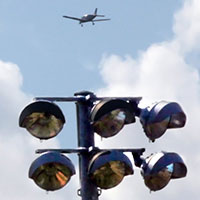 Environmental activists join fight over lead pollution at airport
Environmental activists join fight over lead pollution at airport
STORY
Friends of the Earth, the organization that led a successful effort to halt the Keystone XL pipeline and brought attention to problems at the now shuttered nuclear power plant in San Onofre, Calif., has joined forces with a local group to stop lead pollution at the Vero Beach Airport.
“We bring legal resources and expertise in these kinds of fights to the table,” says James Ross, the group’s development director, who held a strategy session last week with members of the Airport Oversight Committee.
“We think this is a public health issue and an issue of transparency in local government. We know how to leverage the courts to make sure people who live near something like this airport with its incredibly high levels of lead pollution get a fair hearing.”
The Vero Beach Airport has the 28th highest level of lead pollution among more than 3,300 general aviation airports in the United States, according to the Environmental Protection Agency, spreading at least 1,240 pounds of the toxic metal over the city each year.
The Oversight Committee, an ad hoc citizens group, wants the city to monitor lead levels in the air around the airport, test soil in the vicinity, especially in areas where children play, to see how much lead has built up in the 70 years since the main runway went into operation, and also is seeking a phase out the sale of leaded aviation gas.
So far its requests have been rejected out of hand by the city council and the official Airport Commission. When the group brought in an expert on lead pollution and remediation in October to make a presentation to the council, councilwoman Tracy Carroll tried to prevent the presentation from taking place, even though it had been scheduled and placed on the agenda.
Carroll says she doesn’t believe there is any lead contamination near the airport and that she did not want to give the Oversight Committee an opportunity to air its concerns in a televised venue.
Councilwoman Pilar Turner says the group’s presentation was not credible, even though the scientist the group brought in at its own expense to explain the dangers posed to children’s health is the leading expert on the subject in the country.
That expert, Howard, W. Mielke, Ph.D., a research professor at Tulane University School of Medicine, gave testimony about the health dangers of lead before the U.S. Senate in 1982 that was instrumental in passing legislation to rapidly phase out the use of leaded gasoline in cars.
Children can be poisoned by incredibly tiny amounts of lead in their blood and a number of ball fields, playgrounds, schools and nursery schools are in the flight path of the airport’s main runway.
“We have been talking about the issue of lead in avgas since 2004,” says Friends of the Earth Legal Director Marcie Keever. “Airplanes are the one major mobile source of lead emissions still out there.”
FOE filed suit against the EPA in January to force the agency to formally recognize and take action to end lead pollution caused by aircraft burning leaded fuel.
“We are moving through the paperwork process now,” Keever says. “We expect the first hearing on the matter in the new year.”
In the meantime, in a parallel effort, FOE has decided to focus on the local level, putting pressure on Vero Beach, Santa Monica, Calif. and several other cities with airports that emit high levels of lead.
“We have lobbying resources in Washington, D.C., and we have 165,000 members, including many in Florida, we can leverage if we need to show up in force,” Ross says.
As FOE’s chief fundraiser, Ross says he will take information he gathers in Vero Beach and “talk to regional funders and say, ‘This is what is going on, we would like to fund the effort.’
“That is what we do in these kinds of fights and it seems to be a fairly effective model. We don’t win all our battles but we come in where we think we can make a difference do everything in our power to see that justice prevails.”
Besides winning fights over the San Onofre nuclear power plant and the Keystone pipeline, FOE recently stopped the construction of new nuclear reactors in Iowa and forced the EPA to stop ships from burning extremely dirty bunker fuel, a move the EPA expects will reduce smog.
In 1990, Friends of the Earth “took the lead in passing the Oil Spill Pollution Act, requiring double hulls on oil tankers in the wake of the Exxon Valdez spill.”
“The fact that FOE is interested in our cause gives us motivation,” says David Risinger, a member of the Airport Oversight Committee.








